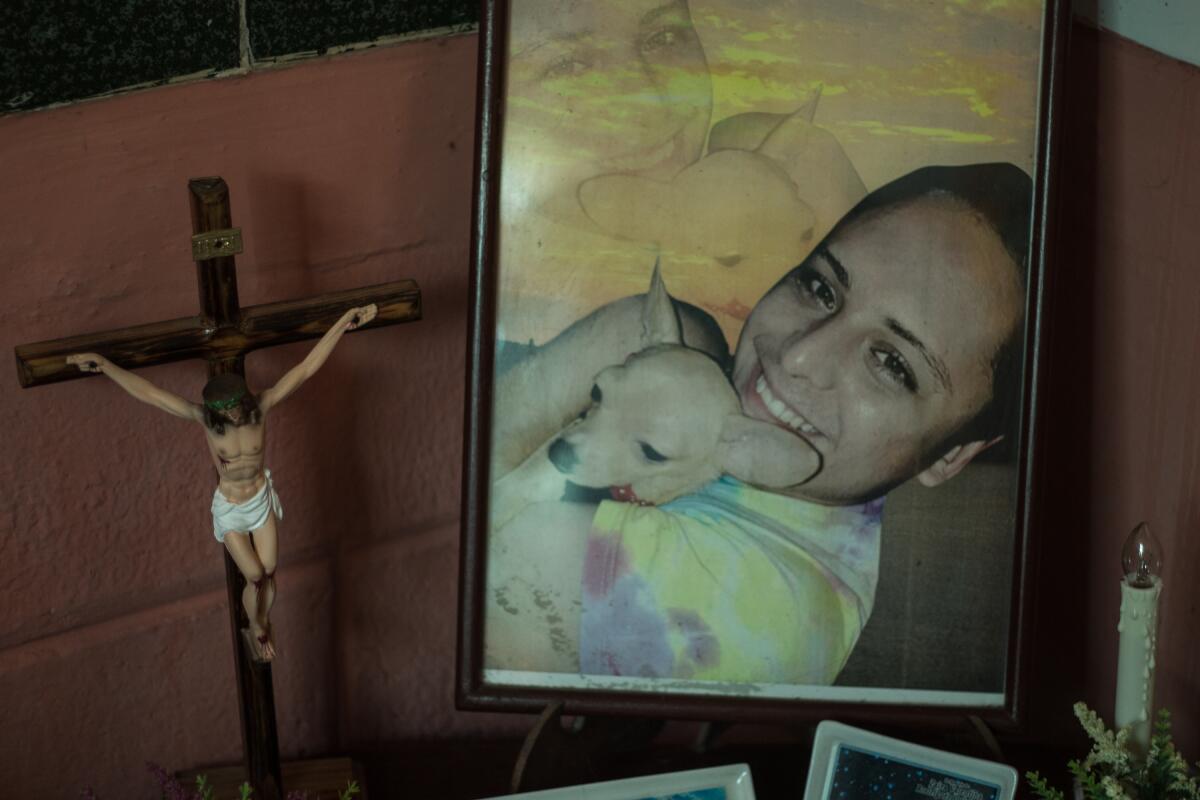Latinx Files: ‘Replacement theory’s’ fatal aftermath

- Share via
When I first read the news about the act of terror in Buffalo, N.Y., that left 10 people dead, I immediately thought of El Paso.
Like in El Paso, a white supremacist armed to the teeth allegedly traveled hundreds of miles to kill as many of those who didn’t look like him as possible, only instead of Mexicans it was Black people who were slain for simply existing. And like in El Paso, the racist suspect left behind a long diatribe explaining that his actions were rooted in the belief that nonwhite people are taking over the country.
The Latinx experience chronicled
Get the Latinx Files newsletter for stories that capture the multitudes within our communities.
You may occasionally receive promotional content from the Los Angeles Times.
This so-called “replacement theory,” which also fueled the hatred behind the 2018 mass shooting at a Pittsburgh synagogue, isn’t new. It’s so ingrained in American culture that it’s mocked in “The Great Gatsby” — a view espoused by the buffoonish blue blood Tom Buchanan — and was a central theme of “The Forever Purge,” a movie in which **spoiler alert** El Paso is overtaken by white supremacists.
This hateful rhetoric isn’t fringe, either. According to a recent poll conducted by the Associated Press and NORC Center for Public Affairs Research, a third of U.S. adults think “an effort is underway to replace U.S.-born Americans with immigrants for electoral gains.”
That’s a lot of people, a fact not lost on politicians and pundits who have used this ideology of fear for their personal gain.
Take Texas Gov. Greg Abbott, who has been employing the “fear of the undocumented immigrant” tactic in his reelection campaign to great success. He currently leads opponent Beto O’Rourke by seven points.
It’s not just Abbott. There’s also J.D. Vance and Ted Cruz and Donald Trump, who used white grievance to win the White House.
And who can forget Tucker Carlson? The talk show host has become the most “influential employee” at Fox News by creating “what may be the most racist show in the history of cable news,” according to the New York Times. Unsurprisingly, Carlson has drawn from the replacement theory well with regularity. He isn’t a liability for Fox. He’s its future.
I wish there were some silver lining in all this that I could point to, but I’m at a loss. I don’t know what to say other than it’s probably going to happen again.
And when it does, people of color will be made keenly aware of the precarity that exists in their otherness.
For more Times voices on the Buffalo mass shooting:
- Gustavo Arellano: I’m part of the ‘great replacement.’ It’s not what believers say it is
- LZ Granderson: The stories we will tell ourselves about the shooting in Buffalo
- Jean Guerrero: White terrorists have ‘Tucker Carlson Syndrome.’ Millions are vulnerable to it
- Erika D. Smith: Buffalo shooting is an ugly culmination of California’s ‘Great Replacement’ theory
- Lorraine Ali: Tucker Carlson hits a dangerous new low in his response to the Buffalo shooting
- The Times Editorial Board: Virulent white supremacy has become normalized. And we let it happen
- Op-Ed: The Buffalo gunman emerged from a far-right ecosystem that’s gone mainstream
Consider subscribing to the Los Angeles Times
Your support helps us deliver the news that matters most. Become a subscriber.
Things we read this week that we think you should read

— Andrea Castillo and Jie Jenny Zou report that Johana Medina Leon, a woman from El Salvador, was quickly released by Immigration and Customs Enforcement as her health took a turn for the worse, according to emails reviewed by The Times. It took six weeks for Medina Leon to get medical treatment while under custody, but only six hours to expedite her release. Medina Leon died four days later, and her death didn’t count toward ICE’s tally.
— Capital & Main has put out a four-story series that looks at overtime pay, the efforts of big business to not pay workers for the extra work that they do, and what is being done by the White House to address this issue.
— Congratulations to Maria Hinojosa and the rest of the Futuro Media crew for winning the Pulitzer Prize in Audio Reporting alongside PRX for the podcast “Suave.” The production house has co-produced a lot of great podcasts that focus/center Latinx stories, including “Ídolo: The Ballad of Chalino Sánchez” (made with Sonoro) and “The Battle of 187” (co-produced by the Los Angeles Times), so the award is very well deserved!
And speaking of podcasting, National Public Radio and LAist are launching an incubator for Latinx creators. If interested, you can apply here.
— For El Faro, Ricardo Valencia wrote about El Salvador’s “brewing default crisis.” Nayib Bukele, the country’s president, has doubled down on bitcoin even as the cryptocurrency has shed nearly half of its value in the last six months.

— The homie Suzy Exposito wrote about Bad Bunny’s new album, “Un Verano Sin Tí,“ and how el Conejo Malo draws inspiration and is influenced by Puerto Rico.
This thing right here from her story:
“Just as French filmmaker Jean-Luc Godard immortalized the swinging postwar zeitgeist of 1960s Paris, or Kanye West bottled the lightning of his Chicago and alchemized it into his own dark, twisted multiverse, Bad Bunny now paints from the palette of Puerto Rico in the 2020s, devising a new modern-day lore for his people — and, with help from visionary Puerto Rican producers Tainy, MAG and La Paciencia, he realizes future-forward sounds for his peers and fans to take in.”
Want to read more about Bad Bunny’s new album? For Gizmodo, Angely Mercado wrote about “El Apagón” and Puerto Rico’s power grid crisis, and Jenny Mota Valdez wrote one of the better reviews of the album for Pitchfork.
— From Well + Good, here’s some advice from a curandera.
— If you follow me on Twitter (Honestly, why would you? It’s nothing but inane thoughts, Mexican memes and sports rants punctuated with a “lmao.”) then you know I have a tendency to poke fun at Austin, Texas. I can’t help it! The city makes itself a target, and as a former resident (RIP La Mexicana Bakery and Las Manitas!) who spent his formative adulthood years living there, it feels like watching your broke film nerd friend who worked at Vulcan Video turn into a crypto bro over the years.
But then you read essays like the one written by Richard Z. Santos for Texas Monthly about Los Verdes, and then you remember why you became friends with the guy in the first place. As Santos explains, the Austin FC supporter group has become one of the city’s “few celebrations of Latinidad.” Don’t get me wrong, I still think their team is corny (THEY HAD A CHANT TO CELEBRATE THE CITY COUNCIL VOTE THAT APPROVED THE STADIUM!) and I’m hoping my childhood club LAFC beat them last night, but it’s genuinely nice that they have this.
The Latinx experience chronicled
Get the Latinx Files newsletter for stories that capture the multitudes within our communities.
You may occasionally receive promotional content from the Los Angeles Times.







